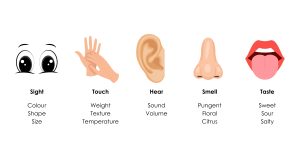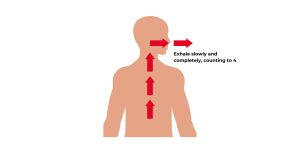To commemorate World Mental Health Day on October 10th, let us take a look at some effective strategies for managing stress and distress. Stress is a universal experience, that affects everyone in their daily lives.
Individuals battling cancer often experience the following stressors:
- What are the potential side effects of my cancer treatment?
- Is there a risk of relapse?
- Can I afford long-term cancer treatment?
Even for those without cancer, it is common to feel stressed about the following:
- How will technological advancements impact my job security?
- Can I afford the rising cost of living?
- Are there potential global crises (e.g. war and pandemic) that will emerge in the coming years?
Effective stress management strategies can help reduce the risk of cancer development associated with chronic stress and improve the chances of recovery for cancer patients. (Stanford Medicine, n.d.).
Grounding Through Senses
Did you know that our five senses (sight, touch, hearing, smell, and taste) can help us in relaxation? By focusing on the present moment, we can temporarily escape from feelings of anxiety.
Choose an object in your immediate environment and examine its characteristics closely:

After the exercise, do you notice any differences in how you are feeling?
Take A Deep Breath
When feeling stressed, do you notice your breathing quicken and become shallow? In the midst of life’s chaos, it’s important to remember to pause and take a deep breath.

As you inhale to a count of four:
- Feel the air entering your nostrils,
- Down through your throat,
- Into your abdomen and feel your belly rise.

Then, as you exhale to a count of four:
- Feel your belly gently contracting,
- Allowing air up through your throat
- Out through your nose or mouth.
Repeat this breathing exercise for a few minutes, focusing on a steady and comfortable pace. To ensure proper technique, place one hand on your chest and the other on your belly. You should feel more movement in your belly hand.
Squeeze! Release!
Have you ever experienced physical symptoms of stress, such as having “butterflies” in your stomach or tense muscles, especially when waiting for medical appointments or preparing for treatment?
Our bodies and minds are connected. By tensing and relaxing different muscles, we can reduce physical stress and promote mental relaxation.
For each body part listed below, tense your muscles for eight counts and then relax. You can choose to focus on specific areas or do them all in sequence.
- Forehead: Raise your eyebrows as high as possible.
- Cheeks: Pucker your cheeks inward.
- Shoulders: Shrug your shoulders up towards your ears.
- Arms: Clench your fists and tighten your upper and lower arm muscles.
- Abdomen: Suck in your stomach as much as possible.
- Thighs: Hold onto your seat and lift your legs off the ground.
- Shins: Straighten your legs and point your toes away.
- Calves: Straighten your legs and flex your toes towards you.
- Soles: Curl your toes and arch your feet.
If any of these movements cause pain, skip them and move on to the next part.
Armed with mindfulness and relaxation techniques, it’s time to incorporate them into your daily routine for optimal stress management. Consistent practice can significantly enhance your well-being.
Should you need someone to talk to, you may reach out to our counsellors for support.






